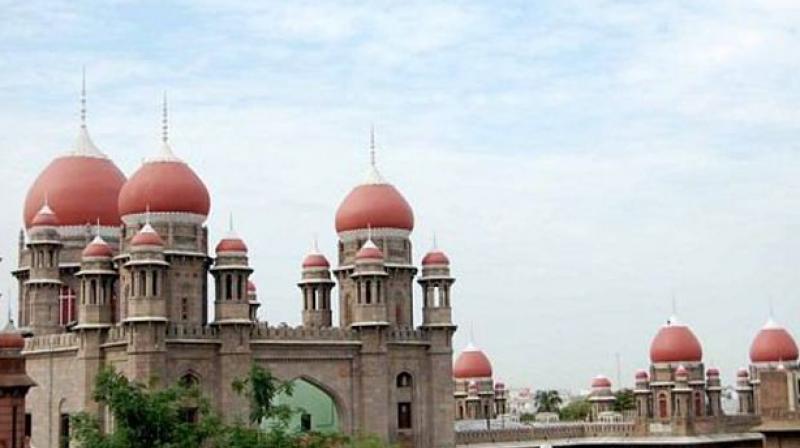Hyderabad High Court to hear plea on demonetisation
The bench told counsel that the matter will be listed in the usual course on Thursday.

Hyderabad High Court
Hyderabad: The Hyderabad High Court will hear a
petition on Thursday seeking to declare the action of the Centre in
withdrawing Rs 500 and Rs 1,000 rupee notes from circulation from the
midnight of Nov 8 and the notification issued in this regard under Sub
Section 2 of Section 26 of the Reserve Bank of India Act, 1934 as
illegal.
Mr K. Srinivas, a practicing advocate in the city, moved the plea against the action of the Centre and also challenged Section 26 (2) of the RBI Act which empowers the Centre to take such action on the basis of recommendations of the Direct Taxes Commission.
Mr P.V. Krishnaiah, counsel for the petitioner, made a mention before
a division bench comprising acting Chief Justice Ramesh Ran-ganathan
and Justice A Shankar Narayana urging it to take up the hearing as the
Centre’s decision had caused inconvenience to the public.
The bench told counsel that the matter will be listed in the usual course on Thursday. He said it had become necessary to challenge provision of the RBI Act which gave arbitrary power to the Centre without prescribing guidelines as to how to exercise such power and under what circumstances it could be exercised. He said the modalities and procedure to exercise such power need to be examined. He said that several High Courts had held that giving such power without prescribing any Act or Rule was arbitrary and illegal.
Mr S. Sriram, advocate at the High Court, who is well-versed with financial matters said, “It is a policy decision of the Centre. No decision is beyond the judicial scrutiny of law courts. The courts may exercise its power applying the parameters of law to test whether the decision is in the overall public interest or not and all alternative methods to not cause inconvenience to the public are in place or not.”
Mr K. Srinivas, a practicing advocate in the city, moved the plea against the action of the Centre and also challenged Section 26 (2) of the RBI Act which empowers the Centre to take such action on the basis of recommendations of the Direct Taxes Commission.
The bench told counsel that the matter will be listed in the usual course on Thursday. He said it had become necessary to challenge provision of the RBI Act which gave arbitrary power to the Centre without prescribing guidelines as to how to exercise such power and under what circumstances it could be exercised. He said the modalities and procedure to exercise such power need to be examined. He said that several High Courts had held that giving such power without prescribing any Act or Rule was arbitrary and illegal.
Mr S. Sriram, advocate at the High Court, who is well-versed with financial matters said, “It is a policy decision of the Centre. No decision is beyond the judicial scrutiny of law courts. The courts may exercise its power applying the parameters of law to test whether the decision is in the overall public interest or not and all alternative methods to not cause inconvenience to the public are in place or not.”